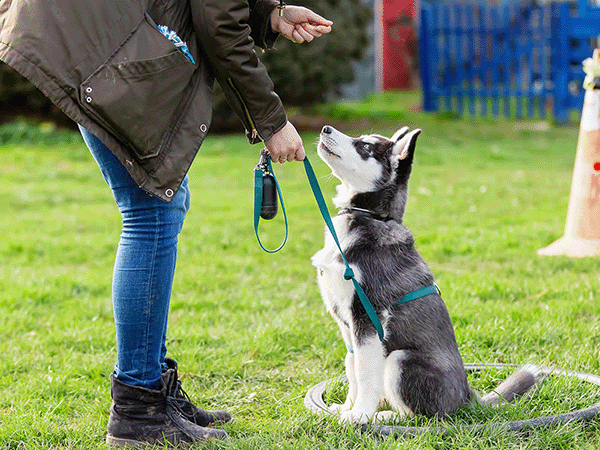Ticks on Dogs: Risks, Prevention, and How to Remove Parasites

Ticks are the definition of creepy crawly. Their reputation for carrying diseases like Lyme makes them particularly hated among dog parents!
While no one wants to find any sort of parasite on their beloved pet, the reality is that at some point you'll probably encounter an attached tick. It's pretty much a guarantee you and your canine companion love to adventure together.
Here’s what dog owners need to know about contact with ticks. Why are tick bites dangerous for your pup—and can tick borne illnesses be treated? How can you prevent ticks from attaching to your dog? What's the best way to remove a tick if you find one on your four-legged friend? And when do you need to head into the vet?
Read on.
1) Risks: Why ticks are dangerous for your dog?
The greatest risk of a tick bite is that your dog will contract a tick-borne disease.
Ticks can carry diseases like Lyme
Lyme disease is caused by the bacterium Borrelia burgdorferi. It's primarily transmitted to dogs through the bite of infected black-legged ticks, also known as deer ticks. These teeny tiny parasites become infected with the bacterium when they feed on contaminated wildlife like deer (hence the name "deer tick") or rodents.
When an infected tick bites a dog and remains attached long enough—typically 24 to 48 hours—it can transmit the Lyme disease-causing spirochete into the dog's bloodstream. Once infected, dogs may experience various symptoms like fever, lameness, joint swelling, lethargy, and lack of appetite (inappetence).
In some cases, untreated Lyme disease can lead to more severe health issues.
Other common tick-borne diseases include:
Ehrlichiosis
This disease is caused by the bacterium Ehrlichia canis. The brown dog tick (Rhipicephalus sanguineus) and the lone star tick (Amblyomma americanum) can transmit Ehrlichiosis to our dogs. Symptoms range from mild to severe, including:
- fever
- lethargy
- loss of appetite
- joint pain
- bleeding disorders
Anaplasmosis
Caused by the bacterium Anaplasma phagocytophilum, anaplasmosis is transmitted primarily by the black-legged tick (Ixodes scapularis) and the western black-legged tick (Ixodes pacificus). Symptoms may include fever, lethargy, joint pain, vomiting, and diarrhea.
Rocky Mountain Spotted Fever (RMSF)
The bacterium Rickettsia rickettsii causes RMSF. Various ticks transmit this disease, including the American dog tick (Dermacentor variabilis) and the Rocky Mountain wood tick (Dermacentor andersoni). Symptoms include fever, lethargy, coughing, loss of appetite, joint pain, and a characteristic rash—but VCA Animal Hospitals says signs of Rocky Mountain Spotted Fever are often vague and non-specific. This can make RMSF hard to diagnose right away.
Are tick borne illnesses treatable?
Tick-borne illnesses in dogs are generally treatable, especially if you diagnose and treat them early.
Specific treatment depends on:
- the type of tick-borne disease
- its severity
- your dog's individual health and any underlying conditions
Some tick-borne diseases are more challenging to treat than others. With appropriate veterinary care, though? Most dogs can recover successfully! The death rate for tick-related illnesses is usually less than 10 percent.
The most common tick treatments in dogs include:
- Antibiotics: Bacterial tick-borne diseases such as Lyme disease, ehrlichiosis, anaplasmosis, and Rocky Mountain spotted fever are often treated with antibiotics. Type and duration of antibiotic treatment will vary depending on the specific disease and its severity.
- Antiprotozoal medications: Diseases caused by protozoans, such as babesiosis and hepatozoonosis, may require antiprotozoal medications to target the parasites responsible for the illness.
- Supportive care: In some cases, dogs with tick-borne diseases may require supportive care to get better. This can include fluid therapy, pain management, and other measures that alleviate symptoms. The goal is to support your dog's overall health during their recovery period!
- Blood transfusions: Dogs with severe cases of tick-borne diseases, especially babesiosis, may require blood transfusions to address anemia and other related complications.
- Follow-up monitoring: After treatment, veterinary check ups ensure your dog has fully recovered. They also enable you and your healthcare team to address any potential complications before they become more serious.

2) How to prevent your dog from getting ticks
Prevention is always better than treatment when it comes to tick-borne illnesses.
Consider routine monthly preventatives
Monthly tick preventatives can be highly effective ways to prevent tick-borne illnesses in dogs. These preventatives come in various forms: spot-on treatments, oral tablets, collars, and more. There's an option for every dog and pet parent!
How do monthly tick preventatives work?
The active ingredients in tick preventatives target ticks at different life stages. This ultimately lowers the risk of disease transmission—the medications work by either killing ticks before they can transmit diseases or by preventing ticks from attaching and feeding on your dog long enough to transmit pathogens.
When used as directed and administered regularly, these preventatives can significantly reduce the chances of your dog contracting tick-borne illnesses.
Your veterinarian will help you choose the right preventative
If you live in—or plan to visit—an area with a high tick population, discuss tick preventatives with your veterinarian. They can recommend the most suitable product based on your dog's specific needs and health status, your budget, and your personal preferences.
Avoid environments where ticks thrive
Ticks can be found throughout the entire United States. Prevalence and specific tick species vary depending on the region and climate, though.
- Deer ticks (the small parasites responsible for Lyme disease) are especially prevalent in the northeastern, north-central, and Pacific coastal regions of the United States. States like Connecticut, Massachusetts, New York, Pennsylvania, Wisconsin, and Minnesota are known for having significant black-legged tick populations.
- The brown dog tick is distributed throughout the United States and is particularly common in warmer regions. Pet parents often find these parasites in homes and kennels. They're a bigger problem in areas with mild winters, like the southern states.
Tick populations fluctuate from year to year. Various factors influence how many disease-carrying parasites will be along your typical walking routes, including weather, climate, and surrounding wildlife populations.
As a general rule? It’s best to assume you and your dog have been exposed to ticks whenever you go outside, and especially in warm months.
Check your dog’s skin and coat after being outside
Know that no prevention method is 100% foolproof. Perform regular tick checks on your dog, especially after spending time in tick-prone areas. This is even more important if your pup has been romping far away from you off leash!

3) What to do if you find a tick on your dog
Even the best prevention falls short sometimes. If you find a tick on your dog—and chances are you will at some point in their lifetime—here’s what to do.
Stay calm!
We know this is easier said than done—especially when you see just how creepy an engorged tick is. But it’s the best thing you can do for your dog. Take a deep breath. Remind yourself you’ve got this. With a few simple steps, you can help your four-legged friend feel better.
Carefully remove the tick
- Gather the necessary tools: You'll need a pair of fine-tipped tweezers or a tick removal tool. Avoid using your fingers—this may increase the risk of disease transmission.
- Find a well-lit area: Choose a well-lit area where you can easily see the tick on your dog's skin.
- Keep your dog still: If your dog is anxious or fidgety, try to keep them as calm as possible during the tick removal process. You may need someone to help hold your dog still if necessary. If you’ve been working on cooperative care skills for handling, this is a great time to put them to use!
- Use the tweezers or tick removal tool: Grasp the tick as close to your dog's skin as possible with the tweezers or tick removal tool. Be gentle and try not to squeeze or crush the tick.
- Pull the tick straight out: Steadily and slowly pull the tick straight upward with a steady motion. Do not twist or jerk the tick. Too much motion can cause the mouthparts to break off and remain embedded in your pup's skin.
- Check for mouthparts: After removing the tick, inspect the area to ensure you have removed the entire tick, including their mouthparts. If any parts remain, use the tweezers to remove them.
- Dispose of the tick: Place the tick in a small container with rubbing alcohol to kill it, or flush it down the toilet. Avoid crushing the tick with your fingers.
Keep an eye out for signs of discomfort
Tick-borne diseases can take time to manifest. Be on the lookout for any symptoms of illness in your dog after a tick bite.
4) When in doubt, contact your vet
If you suspect your dog has been exposed to ticks or is showing any signs of illness—particularly symptoms like fever, lethargy, loss of appetite, or lameness—seek veterinary attention right away.
Early diagnosis and treatment improve the chances of a successful recovery. Your professional vet team is the best way to minimize the risk of complications associated with tick-borne diseases.
Review of this Article
There is so much misinformation out there, and we want to make sure we only provide the highest quality information to our community. We have all of our articles reviewed by qualified, positive-only trainers or veterinarians.
This is the professional that reviewed this article:
Amber Holly, BS, RVT, LVT
Most recent articles
Related articles
Top dog guides per area
Dog training guides

Dog Food Aggression: Why You Shouldn't Punish It
Does your dog ever growl when you walk by their food dish? Maybe they get possessive of treats, carrying them far away and giving you side-eye when you start to approach — or snarling at your other pets or children if they get too close.

Best Dog Fields in the US: 25+ Wide-Open Spaces for Your Pup to Run Free
The best dog fields in the US offer something that traditional enclosed parks simply can't match: acres of open space where your pup can truly stretch their legs and run at full speed. From Colorado's 470-acre prairie meadows to Tennessee's award-winning "Outback," these wide-open spaces allow dogs to roam, explore, and exercise naturally while engaging instincts that cramped urban parks suppress.

The Ultimate Guide to Scent Training for Dogs
Your dog's nose is an amazing tool. Did you know they have 40 times the olfactory receptors than humans? Scent training for dogs taps into this superpower, turning everyday moments into exciting sniff-fests. It's enriching for all types of dogs – reactive, shy, or simply adventurous. Ready to explore the world of scent work for dogs? Let's get started.

Service Dog Training Costs: DIY vs. Pro
More than 80 million Americans rely on their service dogs to help them navigate the world. Task-trained assistance animals perform a huge range of life-changing—in many cases, life-saving—services: These dogs act as eyes for visually impaired handlers, provide mobility support, alert to seizures and blood sugar crashes, interrupt anxiety attacks, remind their people to take medications, and so much more.

How to Deal With Puppy Potty Training Regression

Dirty Dog Syndrome: Causes, Solutions, and Prevention
It's a cringe-worthy moment every dog owner dreads: your furry friend chowing down on something truly disgusting. If your dog has a penchant for poop, you're dealing with coprophagia. It's more common than you think, and thankfully, often manageable. This article explores the reasons behind dirty dog syndrome, from instinct to learned behavior. We'll also give you practical tips to help break this unpleasant habit.

How to Train Your Rescue Dog: A Complete Guide
* All Sniffspot articles are reviewed by certified trainers for quality, please see bottom of article for details *
Dog enrichment guides

Best Dog Water Parks in the US: 15+ Amazing Splash Destinations for Your Pup
Do you have a water-loving dog looking to burn some energy? There are countless dog parks to visit throughout our country — but some of them become far too hot in the midday sun to be safe for your pets to play. That’s why we’ve put together a list of some of the best dog water parks throughout the United States! At these locations, your pup can frolic, splash, and swim to their heart’s content.

Best Dog Fields in the US: 25+ Wide-Open Spaces for Your Pup to Run Free
The best dog fields in the US offer something that traditional enclosed parks simply can't match: acres of open space where your pup can truly stretch their legs and run at full speed. From Colorado's 470-acre prairie meadows to Tennessee's award-winning "Outback," these wide-open spaces allow dogs to roam, explore, and exercise naturally while engaging instincts that cramped urban parks suppress.

Best Toys for Herding Dogs: Keeping Your Pup Happy & Engaged
Herding dogs are amazing, intelligent companions. But that also means they need more than just a simple game of fetch. Finding the right toys for herding dogs is key to keeping them happy and stimulated. This article explores some of the best toys for herding dogs, including options specifically for breeds like Border Collies and Australian Shepherds. We'll help you discover the perfect herding toys for dogs to tap into their natural instincts and keep them entertained for hours.

Tough Dog Toys for Aggressive Chewers: A Practical Guide
Does your dog destroy every toy you give them? Is your house littered with the remnants of plush toys? Are you tired of wasting money on "indestructible" dog toys for aggressive chewers that don't last? Then this post is for you. We'll cover everything you need to know about finding the best dog toys for aggressive chewers, so you can finally give your pup something safe, durable, and fun.

Daily Exercise Calculator: How Much Exercise Does Your Dog Need?
Everyone knows dogs need exercise, but how much is enough? Walks are great, but creating a truly balanced fitness plan means understanding your dog's specific needs. This post helps you develop a daily exercise calculator for your dog, considering breed, age, and lifestyle. We'll cover fun activities, understanding exercise intensity, and recognizing when your pup has had enough. Let's create a plan that keeps your dog happy and healthy!

Complete Guide To Herding With Dogs
* All Sniffspot articles are reviewed by certified trainers for quality, please see bottom of article for details *

Dog Enrichment Activities: The Ultimate Guide
Ever feel like your dog is restless or bored? They may be getting enough exercise, but still need more. That's where enrichment activities for dogs come in. Giving your dog opportunities to sniff, explore, and problem-solve can make a world of difference. Whether you have a puppy, adult, or senior dog, enriching their environment is key for their well-being. Let's explore how to add cognitive enrichment for dogs, even tailoring activities to your dog's breed with breed specific enrichment and fun enrichment games for dogs.
Dog reactivity guides

Rottweiler Aggression: Truth vs. Myth
Many dogs have gotten a bad reputation over the years for being "dangerous breeds." Rottweilers are among them. Like pit bulls and other large, blocky-headed types of dogs, these powerful and beautiful animals are often assumed to be aggressive.

Best Dog Fields in the US: 25+ Wide-Open Spaces for Your Pup to Run Free
The best dog fields in the US offer something that traditional enclosed parks simply can't match: acres of open space where your pup can truly stretch their legs and run at full speed. From Colorado's 470-acre prairie meadows to Tennessee's award-winning "Outback," these wide-open spaces allow dogs to roam, explore, and exercise naturally while engaging instincts that cramped urban parks suppress.

What Is a Reactive Dog? A Practical Guide for Owners
Does your dog suddenly transform into a barking, lunging Tasmanian devil on walks? It's stressful for both of you. If this sounds familiar, you might have a reactive dog. Understanding what is a reactive dog is the first step to calmer walks. We'll explore the common triggers and give you actionable strategies to manage and modify this behavior. Let's turn those stressful walks into enjoyable outings.

How to Socialize a Reactive Dog: A Step-by-Step Guide
Does your dog display reactivity to other pets or people—barking, lunging, or growling when they see their triggers? Whether they're a rescue still settling in, missed critical socialization as a puppy, or had a negative experience, you're not alone. Reactivity is one of the most common dog behavior concerns, and with the right approach, you can help your reactive dog feel calmer and more confident around their triggers.

What Is a Reactive Dog? The Complete Guide for Understanding and Helping Your Pup
Does your dog transform into a barking, lunging tornado the second they spot another dog across the street? You're definitely not alone. According to our research of over 4,000 dog owners, 66% of dogs show some signs of reactivity.

9 Best Online Communities for Reactive Dog Parents
Does your dog's reactivity make walks stressful? You're not alone. Many dog owners face similar challenges. This guide offers practical advice and support for managing reactivity, including finding the best online dog training for reactive dogs. We'll connect you with reactive dog support groups, share training tips, and explore resources like the best dog training app for reactive dogs. Let's build a stronger bond with your dog, together.
* All Sniffspot articles are reviewed by certified trainers for quality, please see bottom of article for details *
How To Groom a Reactive Dog
* All Sniffspot articles are reviewed by certified trainers for quality, please see bottom of article for details *
Sniffspot community guides

The State of Public Dog Parks Across the United States
From 2009 to 2020, there was a 40 percent increase in the development of public dog parks. Designated spots for canine exercise have become commonplace in every major city in North America — many pet owners won’t even consider renting an apartment that doesn’t have its own fenced-in pet area for their canine companions.

Best Dog Fields in the US: 25+ Wide-Open Spaces for Your Pup to Run Free
The best dog fields in the US offer something that traditional enclosed parks simply can't match: acres of open space where your pup can truly stretch their legs and run at full speed. From Colorado's 470-acre prairie meadows to Tennessee's award-winning "Outback," these wide-open spaces allow dogs to roam, explore, and exercise naturally while engaging instincts that cramped urban parks suppress.

How This Family is Affording Their Dream Property Through Renting it Hourly to Dogs
Thousand Oaks, California has been a safe haven for Sniffspot host, Jen, since childhood. Having grown up in busy Santa Barbara, Jen, an introvert from an early age, would seek out solitude and serenity away from tourists attractions and droves of people visiting from elsewhere. “My grandparents own 60 acres about a 30 minute drive from here, and I grew up spending every summer and every holiday visiting them on the ranch,” Jen explained. “In Santa Barbara, we wouldn't go to the beach on the weekend because that's where everybody was, so you'd find places off the beaten path where the tourists weren't. For me, the ranch was just my happy place.”

Host Tips: Ellen K. What Makes Sniffspot Successful for Me
Ellen is the host of Country Pasture Getaway, one of Sniffspot's most popular sniff spots. She has taken the time to write up the lessons she has learned about how to be a great sniff spot host.

How this Oregon Farmer is Making a Business From Renting Her Land to Dogs
Just 20 minutes outside of the busy city of Portland, Oregon, and settled right on the banks of the Columbia River, you’ll find what countless visitors have flocked to the area in search of – mountain views, crisp, clean air, and running water for miles. What you might not expect to find, however, is a hidden oasis designed just for dogs and their people, owned and operated by a farming couple and enjoyed by visitors on two legs, and four.

Host Tips: Fran T. Providing Great Guest Service at our Spot
Fran is the host of Ranch Setting, one of Sniffspot's most popular spots. She has taken the time to write up the lessons she has learned about how to be a great Sniffspot host.

How Sniffspot Helped a Nervous Rescue Work Through His Fears and Change His Family’s Life
This is the story of a family and dog rescuing each other.
Top dog trainers in the US

The Best Dog Trainers in the United States of 2026
This is a list of the top dog trainers in the United States, based on votes from the Sniffspot community and the general public.
The Best Dog Trainers in Seattle, WA of 2026
This is a list of the top dog trainers in Seattle, WA, based on votes from the Sniffspot community and the general public.
The Best Dog Trainers in Portland, OR of 2026
This is a list of the top dog trainers in Portland, OR, based on votes from the Sniffspot community and the general public.
The Best Dog Trainers in Los Angeles, CA of 2026
This is a list of the top dog trainers in Los Angeles, CA, based on votes from the Sniffspot community and the general public.
The Best Dog Trainers in New York, NY of 2026
This is a list of the top dog trainers in New York, NY, based on votes from the Sniffspot community and the general public.
City dog parks guides

Top 10 Indoor Dog Parks: A US Guide
Looking for a space to play with your dog no matter what the weather’s like outside? Look no further than our list of the best indoor dog parks in the United States! These climate-controlled spaces are growing in popularity as pet ownership increases throughout the country. As a bonus, many of them also offer dog training, boarding, grooming, or daycare services on the premises.

Best Dog Fields in the US: 25+ Wide-Open Spaces for Your Pup to Run Free
The best dog fields in the US offer something that traditional enclosed parks simply can't match: acres of open space where your pup can truly stretch their legs and run at full speed. From Colorado's 470-acre prairie meadows to Tennessee's award-winning "Outback," these wide-open spaces allow dogs to roam, explore, and exercise naturally while engaging instincts that cramped urban parks suppress.

Best Dog Parks in the US: Ultimate Guide to Public & Private Off-Leash Adventures
Is your pup giving you those pleading "let me run free" eyes? Whether you're a new dog parent or a seasoned pro looking for fresh adventures, finding the perfect off-leash paradise for your furry friend can feel ruff! From sun-soaked California beaches where your water-loving lab can make a splash to mountain trails in Vermont where your adventure buddy can chase every scent, we've sniffed out the 15 best dog parks across America.

Dog Parks Near Me: Las Vegas Edition
Looking for the perfect dog park near me in Las Vegas? You're in luck! This guide explores all the best options for your pup, from public dog parks to private dog parks near me on Sniffspot. We'll help you find the ideal spot for playtime, socializing, and fresh air. Plus, we'll cover essential etiquette and safety tips to ensure a happy visit for everyone. Get ready for some tail-wagging fun!

Top Sniffspot Locations: Find the Perfect Dog Park
Looking for the perfect dog park? Whether you need a wide-open public space or a private, fenced-in spot, this guide will help you find the best dog parks across the US. We'll cover top-rated public parks, the perks of private dog parks, and even explore Sniffspot locations – giving your pup a safe and fun place to play. Ready to find your dog's new favorite spot? Let's go!

Sniffspot: Portland's Best Private Dog Parks
Ready to discover Portland's best dog parks? Whether you're looking for a public park or the unique experience of a private Sniffspot, this guide has you covered. We'll help you find the perfect spot for your pup, with tips on what to bring, how to prepare, and even understanding dog body language. Plus, we'll explore some top Portland dog parks, including public and Sniffspot options, so you can plan your next dog-friendly adventure in the City of Roses.
Portland Dog Parks: Public & Private Options
This page is about public city dog parks and also includes Sniffspot private dog parks. Sniffspot is the largest network of private dog parks for rent in the world!
Small Dog Park Guide: Tips for Finding the Perfect Spot
Finding the perfect dog park for your small breed can be ruff! Big dog parks can be overwhelming, even dangerous, for little pups. This comprehensive guide helps you sniff out the best small dog parks for your pint-sized companion, covering everything from essential safety checklists to top recommendations for small dog parks across the US—including both public spots and private dog parks.
Dogs breeds

German Shepherd Guide: Best Family Dog? Truth from 9K Owners
The German Shepherd Dog (GSDs) are known for their intelligence, loyalty, and striking appearance. They're also incredibly versatile, excelling as working dogs and devoted family companions. This guide covers everything you need to know about GSDs, from understanding their unique traits and rich history to practical advice on training and care. So, whether you're a seasoned GSD owner or just starting your research, let's explore this remarkable breed together.

Best Dog Fields in the US: 25+ Wide-Open Spaces for Your Pup to Run Free
The best dog fields in the US offer something that traditional enclosed parks simply can't match: acres of open space where your pup can truly stretch their legs and run at full speed. From Colorado's 470-acre prairie meadows to Tennessee's award-winning "Outback," these wide-open spaces allow dogs to roam, explore, and exercise naturally while engaging instincts that cramped urban parks suppress.

Labrador Retriever: America's Best Family Dog? Owner Truth
Discover the Labrador Retriever, a breed celebrated for its playful nature, affectionate temperament, and trainability. Labradors are known for their friendly demeanor and adaptability, making them perfect family companions and versatile working dogs. As one of the most popular types of retrievers, Labs are ideal companions for various lifestyles and are recognized by the American Kennel Club (AKC) as an excellent breed for families.

Golden Retriever Advice: The Complete Owner's Guide
Golden Retrievers: they're gorgeous, playful, and incredibly popular. But before you welcome one into your home, you need the right golden retriever advice. This guide draws on the wisdom of nearly 10,000 Golden Retriever owners, offering practical tips for caring for these affectionate dogs. From understanding their high energy levels to mastering grooming and training, we'll cover everything you need to know. So whether you're already a devoted Golden parent or just starting your research, get ready to learn how to give your furry friend the best possible care.

Are American Staffordshire Terriers Good for First-Time Owners: Complete Guide
Think American Staffordshire Terriers are tough? Think again. While their muscular build might intimidate some, these dogs are known for their playful and loyal personalities. This guide draws on the experience of nearly 10,000 AmStaff owners to reveal the truth about this often misunderstood breed. Want to learn more about caring for an American Staffordshire Terrier? You're in the right place.

Australian Shepherd Facts: Breed Info & Care Guide
Discover the Australian Shepherd, an AKC breed celebrated for its trainable, playful, and affectionate nature. Despite its name, the Australian Shepherd is actually a native breed to the United States, originally developed to breed on farms and ranches. Considered a medium dog, Australian Shepherds were bred for herding beginning in the 1950s. As one of the high-energy breeds, Aussies are known for their boundless energy and need for regular exercise, including aerobic exercise.

Essential Husky Facts for Owners: Breed Guide
Discover the Siberian Husky, a breed celebrated for its curious, intelligent, and loyal nature. Considered a medium-sized dog, Siberian Huskies were originally bred in Russia for sledding, beginning in the early 20th Century. Today, they're one of the most popular active breeds in North America.



























